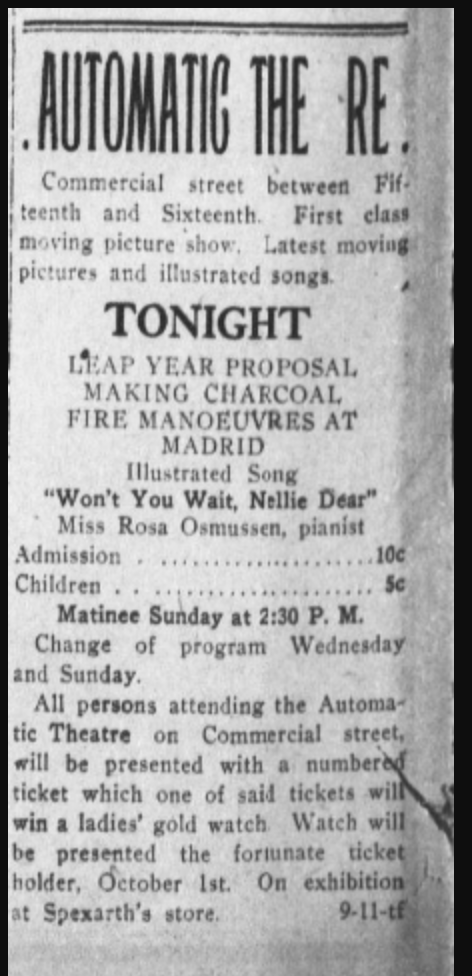
The Morning Astorian in Astoria, Oregon ran this ad for the Automatic Theater September 13, 1908. This short article gives the reader all the information they would need to go see a movie as well as incentivizes them to go. Right below the headline and name of the theater, there is the address or location of the theater, then it tells the reader that it is a "first class moving picture show". Below that, in bold letters to get the reader attention, the article lists which movies it is playing that night, as well as an illustrated song. Then it gives the admission prices for adults and children and the time that it will be starting. To let the readers know when to look again for something new, the article tells them that there is a change in program Wednesday and Sunday. Finally the ad incentivizes them to go to the theater, by stating that they are giving away a "ladies gold watch" and that every person who goes to the theater will receive a numbered ticket. It finishes off the ad by stating that the drawing will be held October 1st.
Newspapers played an important part for theaters around the country at the time. The theaters needed the newspapers as a way to draw in large audiences, and the newspapers needed theaters to advertise in the paper as a way for the paper to make money. Abel explains it as, "Sunday editions looked and functioned some-what like department stores, and a version of the 'display' ads that lured customers into the stores soon filled whole newspaper pages, becoming a major source of revenue." (Abel, 10). So it makes sense that the Automatic Theater would inform the readers that next Sunday, it would release it's change in program to fit along side all the other advertisements in the Sunday paper. It is also interesting to note that many of these advertisements were aimed at women. Abel also says, "85 per cent of the advertising in newspapers and magazines, with the exception of the classified and financial, is dedicated to women and articles women purchase." (Abel, 10). Which might explain why the Automatic Theater included the prize of a ladies gold watch.
It's easy to see why theaters and newspapers were such a good match.
Sources
Morning Astorian, 13 Sep. 1908, p. 8
Abel, Richard. Menus for Movieland : Newspapers and the Emergence of American Film Culture, 1913-1916. University of California Press, 2015.
